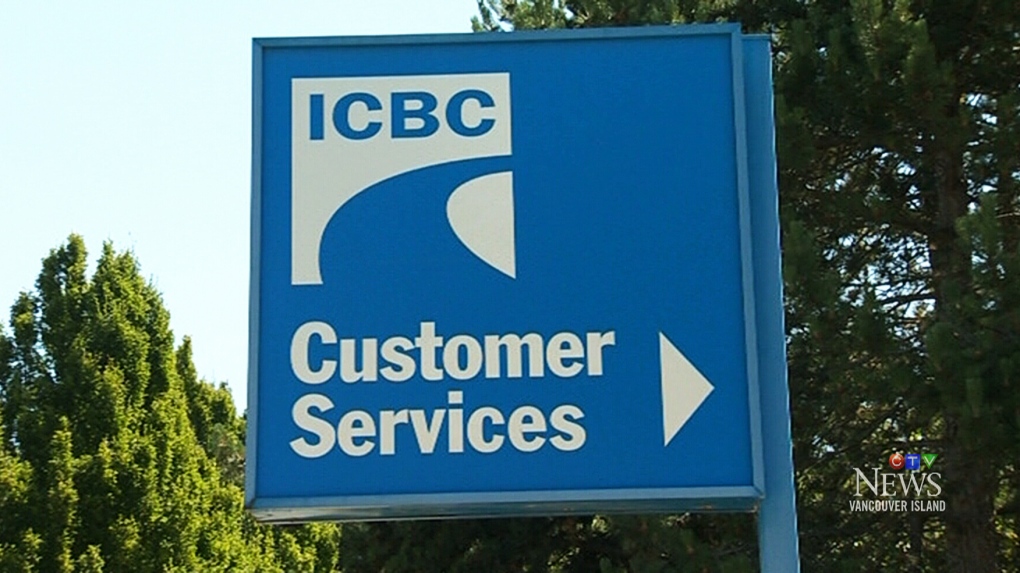ICBC 'acted improperly' in assigning 100% blame to B.C. driver in Washington State crash: CRT

B.C.'s small claims tribunal has reversed a decision by the provincial insurer holding a driver 100-per-cent responsible for a crash that happened in Washington State last year. Instead, the Civil Resolution Tribunal found the man zero-per-cent responsible.
Peter Malakoane was driving in the right lane on a two-lane highway in Washington on Nov. 20, 2022, when the crash occurred, according to the decision issued by tribunal member Peter Mennie on Thursday.
"Two third-party vehicles were involved in an accident ahead of Mr. Malakoane and came to a stop in Mr. Malakoane’s lane," the decision reads. "Mr. Malakoane says he saw the two stationary vehicles and swerved into the left lane, but the front passenger side of his vehicle collided with one of the vehicles."
The decision does not indicate where in Washington the crash occurred, nor the exact time of day it happened. It does say that Malakoane described the road as "pitch black" and said he only saw the vehicle he hit "at the last moment."
About a month after the crash, ICBC informed Malakoane that it had found him 100-per-cent responsible for the crash, citing section 144 of the Motor Vehicle Act, which states that a person must not drive without due care and attention.
"ICBC’s submission in this CRT dispute is essentially that negligence must be apportioned between Mr. Malakoane and the third party vehicle involved in the collision," Mennie's decision reads.
"ICBC says it has not received any evidence to find the third-party vehicle negligent."
The tribunal member didn't accept this assertion, however, noting that it was undisputed that the vehicle Malakoane struck was "stationary on a dark highway with no lights turned on."
That's a violation of a different section of B.C.'s Motor Vehicle Act, which ICBC failed to consider in its analysis of liability for the crash, according to Mennie.
Likewise, while there is an exception for vehicles that are inoperable, there was no evidence presented that indicated that the vehicle Malakoane hit was inoperable.
"The third party driver may also have been negligent for failing to activate its emergency flashers after the collision," the decision notes.
"I find that ICBC’s failure to consider these issues was unreasonable and that ICBC acted improperly in assigning Mr. Malakoane 100-per-cent responsibility for the accident."
Having concluded that ICBC's decision to assign 100-per-cent responsibility was incorrect, Mennie turned to the question of how much responsibility should be placed on Malakoane for the crash.
Malakoane argued he was zero-per-cent responsible, and the tribunal member agreed, noting that the crash was essentially a rear-end collision.
In such cases, Mennie wrote, the four factors that affect liability are the rear driver's speed, the distance between the two vehicles as they were driving along, what the driver of the rear vehicle was doing as they were driving, and how the rear driver responded as the emergency arose.
"In this case, it is undisputed that the third party-vehicle had no lights on and was stationary on the highway," the decision reads.
"Washington State police did not issue a ticket to Mr. Malakoane and there is no evidence that Mr. Malakoane breached section 144 of the MVA by speeding or driving in a careless manner. Faced with an unexpected hazard, Mr. Malakoane took evasive action but was unable to avoid the collision entirely."
Malakoane "acted appropriately" in response to the emergency situation, and so was not responsible for the crash, Mennie concluded.
The tribunal member ordered ICBC to amend its internal responsibility assessment in the case and to pay Malakoane $125 in reimbursement for his CRT fees.
CTVNews.ca Top Stories

Former Liberal cabinet minister Marco Mendicino won't seek re-election
Marco Mendicino, a prominent Toronto member of Parliament and former minister of public safety and immigration, won't run in the next federal election, CTV News has learned.
U.S. soldier shot self in head before Cybertruck exploded outside Trump's Las Vegas hotel, officials say
The highly decorated U.S. army soldier inside a Tesla Cybertruck packed with fireworks that exploded outside Trump International Hotel in Las Vegas shot himself in the head just before detonation, authorities said Thursday.
LIVE UPDATES FBI says New Orleans truck attacker acted alone in 'act of terrorism'
The FBI now says the New Orleans truck attacker acted alone in an 'act of terrorism' when he drove a pickup truck into a crowd of New Year's revellers early Wednesday, killing 14 people.
Toys "R" Us Canada closing 5 stores, expand HMV and add play spaces to some shops
Toys 'R' Us Canada says it is closing five Ontario stores and revamping several others as it works to 'optimize' its business.
Wayne Osmond, singer and guitarist for The Osmonds, is dead at 73
Wayne Osmond, a singer, guitarist and founding member of the million-selling family act The Osmonds, who were known for such 1970s teen hits as 'One Bad Apple,' 'Yo-Yo' and 'Down By the Lazy River,' has died. He was 73.
Grieving orca mother Tahlequah carries dead baby for the second time
The famous mother orca who made waves around the world for carrying her dead calf for 17 days has suffered another tragic loss.
Pickering pausing in-person meeting due to alt-right threats, mayor says
Pickering Mayor Kevin Ashe says the city is pausing all in-person meetings, moving them to a virtual format, for the time being due to “alt-right” threats.
Athabasca 'chop shop' bust yields millions in stolen vehicles, heavy equipment: RCMP
RCMP have made what they call a "major recovery" of stolen property in Athabasca.
FORECAST Weather warnings issued in 7 provinces and territories
Wintry weather conditions, including heavy snow and wind chill values around -55, prompted warnings in seven provinces and territories Thursday.
































